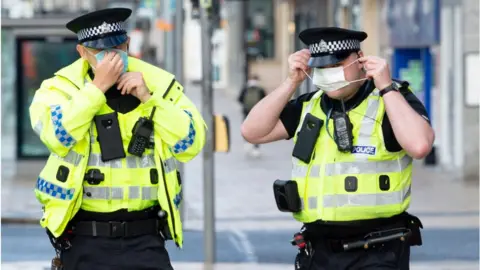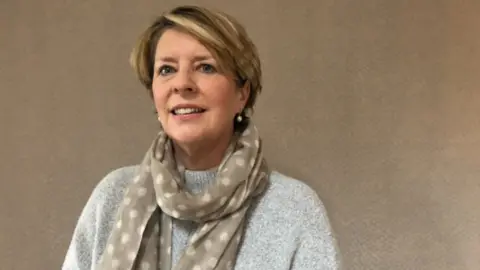Sunak faces backlash over public sector pay freeze
 Getty Images
Getty ImagesRishi Sunak is facing a backlash amid reports he wants to impose a pay freeze on millions of public sector workers.
The chancellor is looking for ways to bolster public finances after a huge rise in spending to fight coronavirus.
Those affected include key workers lauded for their service during the pandemic, such as the police, teachers, armed forces and civil servants.
While frontline NHS staff would likely be excluded, unions have expressed outrage, calling the plan "insulting".
The Treasury said it did not comment on speculation, but pointed out that public sector pay restraint was mentioned by Mr Sunak in a letter in July outlining his plans for a Spending Review.
Details of that review, and how much money will be allocated to departments during the 2021-22 financial year, are due to be unveiled next week.
The July letter outlined that in the "interest of fairness we must exercise restraint in future public sector pay awards, ensuring that across this year and the spending review period, public sector pay levels retain parity with the private sector".
The challenge facing the chancellor was underlined on Friday by figures showing that government borrowing hit its highest October level on record last month as the UK continued heavy spending to support the economy.
But news that a pay freeze was being considered sparked anger among unions. Unite said a cap would be "insulting to those public sector workers that have underpinned the fabric of society during this continuing pandemic".
"In the spring, the Prime Minister was praising NHS staff for saving his life. Now, in the autumn, he needs to ensure that his chancellor turns those warm words into hard cash for those that ensure the efficient running of the NHS, schools and colleges, and the myriad of services provided on a daily basis by local councils."
'Industrial action'
Unison general secretary Dave Prentis said it would be a "cruel body blow" to NHS staff not on the frontline. "Key workers across all public services remain at the heart of the fight against Covid," he said.
And Matt Wrack, the Fire Brigades Union general secretary, said: "We warned ministers in the summer that clapping key workers would not pay the bills - but it seems in government memories are short, and morals in short supply.
"It won't be lost on workers that their wages are set to be cut whilst the government continues to hand out contracts worth billions of pounds to its cronies."
 Getty Images
Getty ImagesMark Serwotka, general secretary of the Public and Commercial Services union, said his members had kept the country running and warned of possible industrial action.
"Our members have been providing universal credit, collecting tax, securing our borders and prisons in this unprecedented pandemic and have already suffered 10 years of pay restraint," he said.
"Private companies have been allowed to secure lucrative Covid contracts to the tune of £17bn, yet ministers are not prepared to reward their own staff for all the incredible work they have done this year?
"If Rishi Sunak fails to pay public sector workers properly, there will be widespread anger and industrial action cannot be ruled out."
In July, almost 900,000 public sector workers were given an above-inflation pay rise - including doctors and teachers - because of their "vital contribution" during the pandemic. But there were complaints that many workers missed out.

How has public sector pay changed over time?
The public sector is the name given to anyone whose salary is paid directly by the government. This includes:
- 1.5 million workers in education, such as teachers and teaching assistants
- 1.8 million in the NHS, such as nurses, doctors and porters
- 460,000 civil servants
In total, there are around 5.5 million public sector workers, representing around 17% of all employees in the UK.
Because they are funded by government money, their salary is decided by boards who work with government departments, unions and other groups to come up with annual recommendations on how much pay should change by.
But the government sets "remits" for these boards. Between 2011 and 2018, most public sector pay was either frozen or capped at 1% as part of the government's austerity measures aimed at reducing the deficit.
This meant that as prices increased with inflation, salaries did not keep up. Since 2018, most of the public sector has seen above-inflation pay increases.

Health Secretary Matt Hancock refused to comment on whether he had fought for NHS workers to be exempt from a possible pay freeze. He told the BBC he wasn't going to comment on internal discussions, adding that he "will always fight for the NHS… there's an incredibly tough economic situation as well".
In September, the Office for National Statistics calculated that public sector workers earned, on average, 7% more than private sector workers last year.
Any gap would have further widened in a year that has seen falls in private earnings during pandemic shutdowns, while public sector wages have been maintained.
But Ben Zaranko, an economist at the Institute for Fiscal studies, said the move would come on the back of a decade of public sector pay caps and freezes.
"Relative to pay in the private sector, public sector pay prior to the pandemic was its lowest point in more than 25 years," he said.

How have workers reacted to news of a public sector pay freeze?
 Chris Sheridan
Chris SheridanChris Sheridan, a social worker in the South West, told BBC 5Live: "My concern is not for me, it's about those who are going to suffer because they're already on minimum wage as it is. I think a lot of carers have been overstretched and overworked."
And James, a police officer in London, said a pay freeze would feel like a "churlish" move from government.
"There's loads of ways the government can raise funds. It doesn't need to be by penalising people that have worked all the way through this pandemic and put themselves at risk."
 Victoria
Victoria But some private sector workers said a pay freeze seemed fair, when so many outside the public sector are struggling.
Victoria Farley, who has run a tea room in Cumbria for 12 years, said she was set to "lose everything" at the moment.
"I've had no income, [and] had to make all my staff redundant. They say we're all in it together but we're clearly not. I'd love to be in steady work with a pension like public sector workers."


Do you work in the public sector? Share your views and experiences by emailing [email protected].
Please include a contact number if you are willing to speak to a BBC journalist. You can also get in touch in the following ways:
- WhatsApp: +44 7756 165803
- Tweet: @BBC_HaveYourSay
- Please read our terms & conditions and privacy policy
If you are reading this page and can't see the form you will need to visit the mobile version of the BBC website to submit your question or comment or you can email us at [email protected]. Please include your name, age and location with any submission.
